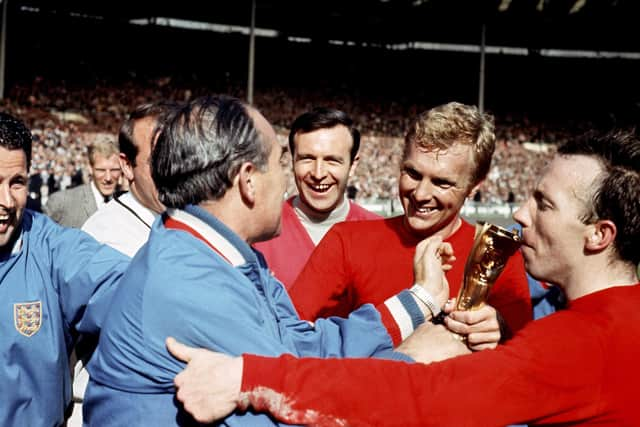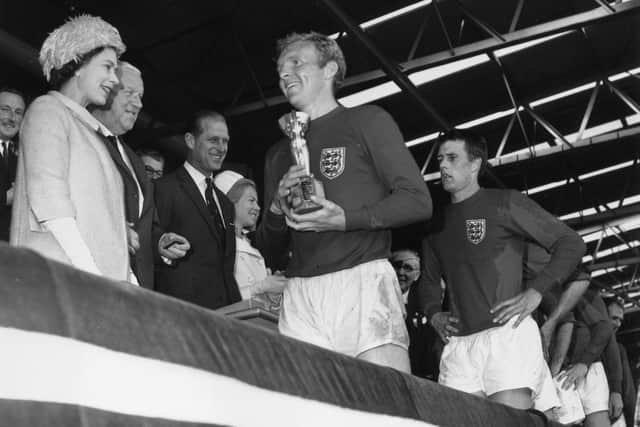England World Cup win 1966: Menston author explores truth and mythology in Sir Alf Ramsey's team
Sports writer Duncan Hamilton had seen these images of England beating West Germany in the final numerous times since watching it live at his grandfather’s house as a boy on July 30, 1966.
When it was scheduled for broadcast on Channel 4 during the summer Covid lockdown of 2020, he wasn’t too bothered about seeing it again – he had grown tired of the same old stories of that day. But something drew him in.
Advertisement
Hide AdAdvertisement
Hide AdHad he changed the channel, he would not have written Answered Prayers, his upcoming book exploring not just the 1966 victory, but the context around it and the myths which have been repeated in the years since.


"All the best sport books are never about sport, they’re just all about the human condition and the time in which they’re set,” says Duncan, 64, of Menston, between north Bradford and Leeds.
Born in Newcastle, Duncan grew up in Nottingham, where his father Jim found work in the pits.
As a sports journalist at the Nottingham Evening Post in the late 1970s and 1980s, he built a relationship with a Nottingham Forest’s famous manager in what was a markedly different time for media relations.
Advertisement
Hide AdAdvertisement
Hide AdDuncan, in those days, “used to pull up in the morning at the City Ground and talk to Brian Clough over a Scotch”.


He adds: "He taught me how to read a football match. Which is a bit like being taught physics by Albert Einstein or art by Picasso. I couldn't really have done that much better.”
Later, he worked for The Yorkshire Post, becoming deputy editor, and now focuses mainly on writing books.
He has won three William Hill Sports Book of the Year prizes – one for Provided You Don't Kiss Me: 20 Years with Brian Clough - and two British Sports Book Awards.
Advertisement
Hide AdAdvertisement
Hide AdHe most recently collaborated with Bradford-born cricketer Jonny Bairstow on his autobiography, A Clear Blue Sky.


Watching the ‘66 final three years ago, it seemed a world away from today’s game. Wembley was unrecognisable. Nobody was trying to con the referee. The final moments of extra time were not even played out near the corner flag.
As the players made their way up to the royal box, he couldn’t help thinking, too, of how they and manager Sir Alf Ramsey – he was knighted the year after – would be defined by that moment but never again live up to its mythology.
“It was a much more poignant tale than I thought,” says Duncan.
Advertisement
Hide AdAdvertisement
Hide AdPromotional material for the book describes how 1966 was not a “guaranteed path towards more success, but instead a slow decline and fall, and a trail of disappointments”, and of how the victory was “dulled through constant repetition, with the same images shown again and again over the interceding years”.
Duncan adds: “All the books that I’ve got about the World Cup were essentially about the actual tournament itself. I was interested in the hows and whys, and simply trying to explore what was true and what wasn’t true. Because I did find that there were a lot of things that people assumed were true but which weren’t true - (such as) the fact that it was a fairly comfortable for England because they were at home, the fact that Bobby Charlton was always considered to be the golden boy, which he wasn’t.
"Even people like Gordon Banks, who we considered to be the greatest goalkeeper in the World. There were people in 1964-65 who didn’t even think he should be in the England team.”
Another example he cites is that Sir Alf didn’t actually say, before extra time, as is often repeated: “You’ve won it once. Now go and win it again.”
Advertisement
Hide AdAdvertisement
Hide AdHis book reports that what he actually said was: “You’ve let it slip once. Don’t let it slip again”.
Duncan says: “It’s not as dramatic – it doesn’t sound like Churchill, does it? People wanted that Churchillian kind of resonance rather than the more prosaic.”
He’s grateful to David Stanley – son of late former England agent Ken Stanley, friend of Sir Alf – who has been one of his valuable sources.
Answered Prayers also charts rise of Sir Alf, the construction of the team of players for the tournament but also that there was an “institutional inability” to appreciate them. This culminated with the manager being sacked in 1974. Duncan says: “He was kind of cast out, the Football Association completely ignored him. He was treated absolutely brutally.”
Advertisement
Hide AdAdvertisement
Hide AdNot only was the pay relatively poor but, on the FA’s “petty” behaviour, Duncan highlights one bizarre episode in which secretary Sir Denis Follows refused to give squad members table and drinks mats commemorating the World Cup because they were exclusively for FA council members and visiting officials.
Sir Alf, despite having ample opportunity to manage elsewhere, “was so loyal to them that he just wouldn't go anywhere”.
Where did the FA’s attitude come from?
“I think it came from class,” says Duncan. “If you look at the FA, they were all wealthy businessmen. Some of them had been to public school. And there was a kind of ‘know your place’ tendency.”
Footballers, he says, “could be used – and they could be discarded”.
Answered Prayers: England and the 1966 World Cup is published in hardback by riverrun on August 31.